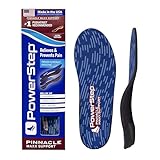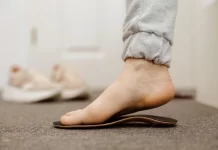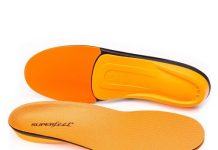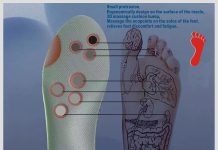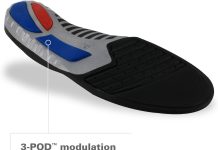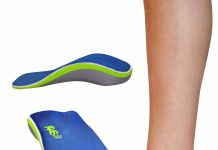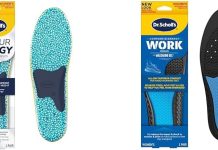Do you have Arthritis? If so, then you know the pain and discomfort that comes with it. But what if we told you there was a way to make a living with Arthritis easier?
We are introducing insoles for people with Arthritis – an innovative product designed to relieve painful symptoms associated with this condition.
Living with Arthritis can be difficult, but these special insoles were explicitly created for those who suffer from the condition.
They provide additional arch support and cushioning, which helps reduce joint pressure, providing long-term comfort throughout your day.
Additionally, they are crafted using premium materials that are breathable and moisture-wicking, ensuring a cool and dry foot environment no matter how active you’re feeling!
So don’t let your Arthritis get in the way of enjoying life – give yourself some extra support today by investing in insoles made just for people like you who have Arthritis.
With them, your days will be more comfortable and enjoyable!
Definition Of Arthritis
Arthritis is a condition that affects the joints. It’s characterized by inflammation and pain, which can range from mild to severe.
The term “arthritis” refers to more than 100 different types of joint diseases and related conditions. Common types of Arthritis include osteoarthritis, rheumatoid Arthritis, gouty Arthritis, psoriatic Arthritis, juvenile idiopathic Arthritis, and ankylosing spondylitis.
The causes of these various forms of Arthritis vary widely but often involve genetic factors, environmental exposures, or lifestyle choices.
Osteoarthritis occurs when cartilage in the joint wears away over time due to age or repetitive use. Rheumatoid Arthritis is caused by damage to the immune system resulting in painful swelling of the affected joint(s).
Gouty Arthritis develops when uric acid builds up in the bloodstream and crystals form around a joint, causing intense pain and swelling. Psoriatic Arthritis is linked with psoriasis on the skin or scalp. In contrast, juvenile idiopathic Arthritis typically appears before 16 years old and involves swollen joints accompanied by fever, rash, or eye problems.
Ankylosing spondylitis is an inflammatory type of spinal arthritic disorder that commonly leads to stiffness in joints connected to the spine.
There are many treatments for Arthritis, including medications such as nonsteroidal anti-inflammatory drugs (NSAIDs), corticosteroids, and biologic agents; physical therapy; exercise; diet changes; and other self-care measures like using insoles explicitly designed for those with this condition.
These specially designed insoles support feet, reduce strain on feet muscles, cushion pressure points from hard surfaces, absorb shock from walking activities, and help distribute body weight evenly across both feet for improved balance and stability.
Symptoms And Impact On Mobility
Arthritis can cause a range of symptoms, which have an impact on mobility and quality of life. Pain is one of the most common arthritis symptoms, with joint stiffness another primary symptom.
Joint pain usually feels like a dull ache or burning sensation in the joints, while joint stiffness often involves difficulty moving and using those affected joints. Both can significantly limit an individual’s ability to do everyday activities such as walking, running, climbing stairs, bending down, lifting objects, and more.
In addition to physical limitations caused by arthritis-related pain and joint stiffness, there are psychological effects due to decreased mobility. These include frustration and depression from being unable to partake in certain activities previously enjoyed before developing Arthritis.
Some people may even find it difficult to leave their homes because they cannot move around quickly. All these factors lead to a lower quality of life for people living with Arthritis compared with individuals who do not experience similar issues related to mobility problems.
Insoles designed for arthritic patients can help reduce pain levels and improve flexibility so people suffering from this condition can better manage their daily lives without having to worry about increased discomfort or reduced mobility due to their condition.
With insoles providing cushioning and arch support tailored specifically for them, people with arthritis wicannjoy greater comfort when walking or exercising while protecting their feet against further injuries that could otherwise worsen their existing conditions.
Benefits Of Insoles For Arthritis Patients
Insoles for arthritis patients offer several benefits. Ankle stability, joint pain relief, and improved posture are all possible with holes explicitly designed to reduce inflammation in joints affected by Arthritis.
This can be particularly beneficial for people who suffer from severe pain or discomfort due to their condition. Furthermore, shock absorption is another benefit that insoles provide; this helps to protect sensitive joints further and reduce associated inflammation.
Using insoles also encourages correct body alignment w, which reduces strain on specific body parts.
This can result in less pressure be already weakened joints and allows users to move around more freely without fear of exacerbating existing conditions. Additionally, arch support offered by insoles is an essential feature as it assists in maintaining a healthy balance while walking or running.
Finally, research has suggested that wearing insoles regularly could poslowhe progression of arthritis symptoms.
As they provide cushioning and protection to vulnerable areas like ankles, knees, and hips, they help prevent further damage caused by regular physical activity such as walking or running.
In addition, some studies have even indicated that wearing insoles may improve overall comfort levels for those with Arthritis despite ongoing discomfort in other areas of the body.
Footlogics Full-Length Soft Orthotic Shoe Insoles with Gentle Arch Support for Arthritis, and Sensitive Feet - Sensi, Pair, S
Superfeet BLUE - Foam Shoe Insoles for Medium Arch Support - 9.5-11 Men / 10.5-12 Women
Superfeet GREEN - High Arch Orthotic Support - Cut-To-Fit Shoe Insoles - Men 7.5-9 / Women 8.5-10
Types Of Insoles Available
When finding insoles for people with Arthritis, a few different types are available. Orthotic insoles are designed to provide support and cushioning for the feet, helping to alleviate pain from arthritic conditions.
They also help correct any misalignments in the foot structure, which can contribute to joint pain.
Gel insoles offer additional cushioning for those who suffer from extreme discomfort due to their condition. These insoles come in various shapes and sizes depending on individual needs.
Orthopedic insoles are specifically designed for individuals with Arthritis as they feature added arch support, heel stabilization, and cushioning that helps relieve pressure around joints.
Shock-absorbing insoles are also helpful because they reduce impact when walking or running, not aggravating existing symptoms of Arthritis. Cushioned insoles give antra comfort and protection against further injury, making them perfect for anyone suffering from this painful condition.
Whatever type of insole you choose, ensure it is comfortable and supportive enough to meet your needs.
Doing research before buying an insole will ensure that you find one that fits properly and meets all your requirements.
By doing so, you’ll be giving yourself much-needed relief while still being able to remain active without feeling too much discomfort from Arthritis flflare-ups
How To Choose The Right Insole For You
Choosing the right insoles for people with Arthritis can be daunting.
There are so many options, and it’s essential to ensure you get a quality product that provides optimal support and comfort to reap the full benefits of wearing them.
For people living with Arthritis, here are some tips on what to look for when selecting an insole:
- Make sure the sole is designed specifically for those with arthritic feet.
- Choose an insole made from foam or gel that offers cushioning and shock absorption.
- Look for insoles that provide arch support and heel cups w, which will help reduce pressure points and aid alignment.
- SeTo prevent discomfort while walking, select an insole with extra padding around sensitive areas such as bony protrusions, bunions, hammertoes, etc.;
it’s also essential to consider your lifestyle and activity level when choosing the right insoles; if you’re doing a lot of physical activities like running or hiking, you’ll want a more supportive design than someone who mainly walks around town.
Finally, always consult your doctor before purchasing any orthotic device for your feet – they may have specific recommendations based on your needs and condition.
Caring For Your Insoles
Once you’ve chosen the correct insole for your needs, ensuring they are adequately cared for is essential.
This includes following care instructions, cleaning tips, and learning to store them correctly. By properly caring for your insoles, you can ensure they last longer and provide maximum support.
When caring for your insoles, read the manufacturer’s care instructions first. These will tell you what materials your insoles are made from and which cleaning products should be used.
Use a mild soap and warm water solution rather than harsh chemicals or solvents if possible. Rinse with cool water after washing and allow time for drying before wearing again. Also l, look out for any wear & tear on the material – such as cracks or worn spots – which may indicate that it is time to replace them.
Proper storage is also essential when preserving the lifespan of your insoles. Avoid storing them near heat sources like radiators or direct sunlight,t as this could damage their structure over time.
Following these tips can help extend the life of your orthotic inserts by keeping them in good condition and ensuring maximum comfort at all times! Following these tips can help extend the life of your orthotic inserts by keeping them in good condition and ensuring maximum comfort at all times!
Following these tips can help extend the life of your orthotic inserts by keeping them in good condition and ensuring maximum comfort at all times!
Keep them away from moisture too if necessary, put silica gel sachets inside the box or container where you keep them to absorb any excess humidity. Finally, always remember to taremoveour insoles before putting on shoes so that extra pressure isn’t applied unnecessarily while walking or running.
To get the most out of your insoles and ensure they maintain their cushioning properties, follow these simple steps: read through all care instructions carefully; clean regularly using a gentle soap; dry thoroughly before each use; avoid exposing to high temperatures; store away from moisture; and remove before wearing shoes again.
Footlogics Full-Length Soft Orthotic Shoe Insoles with Gentle Arch Support for Arthritis, and Sensitive Feet - Sensi, Pair, S
Superfeet BLUE - Foam Shoe Insoles for Medium Arch Support - 9.5-11 Men / 10.5-12 Women
Superfeet GREEN - High Arch Orthotic Support - Cut-To-Fit Shoe Insoles - Men 7.5-9 / Women 8.5-10
Common Questions About Insoles For people living with Arthritis
People with Arthritis often struggle with mobility and seek ways to make their lives easier. Insoles can be an excellent treatment option that helps alleviate the pain caused by Arthritis.
There are many questions surrounding insoles for those suffering from Arthritis, so let’s look at some of the most common ones.
One concern is whether or not these insoles will work for people with different types of Arthritis. The answer is yes; insoles can help relieve symptoms regardless of what type of Arthritis you have.
They provide cushioning and support that reduce strain on joints, allowing sufferers to move more freely without feeling as much discomfort.
Another question is how long it takes to see results when using an insole designed for those with Arthritis. While results may vary depending on individual cases, most people feel relief after one or two weeks of use.
It’s important to note that while they won’t eliminate pain, they offer relief, allowing sufferers to enjoy greater comfort and increased mobility over time.
Insoles can be a great way to ease the discomfort associated with Arthritis and improve your quality of life overall.
With proper care, they last up to six months and can provide lasting relief from painful symptoms – making them an effective alternative treatment option worth considering.
Alternative Treatment Options
In addition to insoles for people with Arthritis, several alternative treatment options are available.
Natural remedies, such as herbs and essential oils, can be used with over-the-counter pain relief medications. Dietary changes may also help alleviate symptoms of Arthritis by reducing inflammation.
Certain foods that contain anti-inflammatory properties, like ginger and turmeric, have been shown to reduce joint stiffness and swelling.
Additionally, regular exercise plans designed specifically for people who have Arthritis will help keep joints flexible and strengthen the surrounding muscles. ExBefore starting any plan, exercise should always be discussed with a doctor be ensure it is safe for an individual’s particular condition.
Managing pain due to Arthritis requires attention to both physical and mental health. Taking part in activities that bring joy can help lower stress levels, improving overall well-being.
Mindfulness practices such as yoga or meditation are also beneficial for managing chronic pain. If lifestyle modifications alone do not provide enough relief from arthritic symptoms, further medical intervention may be necessary, so consulting with a physician is highly recommended.
Overall, care must be taken when managing pain related to Arthritis. Researching different approaches, including natural remedies, dietary changes, exercise plans, and even medical interventions c, can lead to improved quality of life while living with this condition.
Frequently Asked Questions
How Long Do Insoles Typically Last?
When it comes to insoles, one of the most common questions is: how long do they last? The lifespan of insoles depends on several factors, including the quality, type, and amount of use.
Generally speaking, when cared for properly, an insole can have a life expectancy ranging from three months to two years or more.
The durability of an insole will vary based on the materials used and its intended purpose. Comfort-oriented designs with softer cushioning materials may break down quicker than those with denser foam and firmer plastic supports.
Considering these differences when selecting to get optimal performance over time is essential.
How often an insole is worn can affect its longevity; if it’s only used occasionally, it should last longer than if worn daily. Taking good care of your insoles by cleaning them regularly and storing them away from direct sunlight can help keep them looking and feeling new for extended periods.
Can Insoles Be Worn With All Types Of Shoes?
One of the most common questions regarding insoles is whether they can be worn with all types of shoes. The answer depends on what type of shoe and insole are used.
Generally speaking, you should be able to wear any insole with almost any kind of shoe; however, some exceptions may need to be taken into consideration when choosing an insole for a particular pair of shoes:
* For an insole to provide the best comfort and support, it must have been designed specifically for the type of shoe it will be inserted into.
* Shoes made from materials like leather or suede require more cushioning than those made from synthetic materials such as nylon or polyester.
* If someone has Arthritis, their doctor may recommend specific insoles that could help reduce pain and inflammation associated with the condition.
In other words, finding the correct insole for your feet—and shoes—is essential if you want them to last longer and provide optimal comfort and support.
This means considering factors such as the material your shoes are made from, how much cushioning they need, and any special requirements due to medical conditions such as Arthritis.
Doing so will ensure that you choose an insole that meets your needs while providing adequate support and comfort throughout its lifetime.
Footlogics Full-Length Soft Orthotic Shoe Insoles with Gentle Arch Support for Arthritis, and Sensitive Feet - Sensi, Pair, S
Superfeet BLUE - Foam Shoe Insoles for Medium Arch Support - 9.5-11 Men / 10.5-12 Women
Superfeet GREEN - High Arch Orthotic Support - Cut-To-Fit Shoe Insoles - Men 7.5-9 / Women 8.5-10
Are Insoles Suitable For All Types Of Arthritis?
Understanding how different types of footwear can help those with this condition is essential.
Arthritis is a chronic pain disorder that impacts the joints and causes inflammation and stiffness. While there is no one-size-fits-all solution, wearing the correct insoles can make life easier for people suffering from its symptoms.
Insoles are designed to support the feet, reduce pressure points, absorb shock, and keep arthritic joints in proper alignment.
Depending on the individual’s needs, different insoles may be more beneficial when used with specific shoes; however, many insoles are suitable for all types of footwear. It’s best to consult your doctor or physical therapist before investing in an insole, as they will know which type works best for you.
Before purchasing any insole, check its features carefully: look at what materials have been used (softer materials like foam typically work better), whether it provides cushioning or arch support, f it has anti-slip properties or padding around critical areas such as the heel and toes.
In addition, consider if the fit is comfortable enough to wear over long periods – some brands offer custom shapes, so these might be worth looking into too.
Ultimately selecting an appropriate insole depends on each person’s unique circumstances,s. Still, by researching thoroughly and speaking to medical professionals first,t you can ensure that you find something suitable for all types of Arthritis.
Are There Any Side Effects Associated With Wearing Insoles?
When wearing insoles, many people are concerned about potential side effects.
After all, if you’re putting something in your shoe as a way to help with joint pain and Arthritis, it’s essential to know whether there are any risks associated with it.
Fortunately, most people who wear insoles report no noticeable side effects. However, when using them, some may experience aches, swelling, cramps, or fatigue. It is also possible that they can cause discomfort depending on how well they fit into the shoes and how often they are worn.
One thing to remember is that everyone’s feet and arthritic condition are unique. As such, what might be comfortable for one person could be uncomfortable for another.
Therefore, it’s recommended that people try different soles until they find the right ones for their needs – this helps ensure maximum comfort while reducing the risk of adverse side effects. Additionally, those who feel discomfort should stop wearing them immediately and consult a doctor before trying again.
Although most people don’t experience anxiety issues with wearing insoles due to Arthritis, it’s still important to proceed with caution when selecting and using them.
Careful consideration should be taken when choosing which type will work best for each situation and regularly assessing whether changes need to be made. That way, you can rest assured, knowing you have done everything possible to avoid any adverse reactions from occurring.
Does Insurance cover Insoles?
When it comes to questions about insurance coverage for insoles, there are a few things that need to be considered.
Insoles can help people with Arthritis manage their symptoms and improve their quality of life, but they come at a cost. Many insurers don’t cover the total cost of insoles as part of medical reimbursement plans, leaving individuals responsible for any costs not paid by their insurer.
In some cases, however, an insurer may provide partial or complete coverage for insoles if specific criteria are met. You must check your insurance plan carefully to determine whether you qualify for reimbursement.
Some insurers may require proof from a doctor that the individual has been diagnosed with Arthritis to receive coverage. Additionally, many health insurers have limits on how much they will pay out towards the purchase of insoles each year.
It’s also possible to take advantage of tax credits or deductions available through Medicare and other government programs to reduce the financial burden of purchasing insoles.
Before deciding about insurance coverage, it is best to speak directly with your provider and ask them what options are available when covering insoles costs for those with Arthritis.
Conclusion
In conclusion, insoles can provide relief to people with Arthritis. They are relatively affordable and easy to use; however, it’s essential to consider how long they will last before purchasing them.
It is also essential to make sure that the insoles are suitable for your type of Arthritis, as well as compatible with the shoes you wear most often.
Additionally, be aware of any potential side effects of wearing insoles and whether insurance may cover them. If you’re looking for a way to manage the pain associated with Arthritis, insoles might be worth considering!
I have found great benefits from wearing insoles since I was diagnosed with Arthritis. The added cushioning has helped me stay active without feeling too much discomfort in my joints.
As someone who knows firsthand about living with this condition, I’d highly recommend trying insoles if your feet need extra support when walking or engaging in physical activities.
Incorporating insoles into your daily routine can help improve comfort levels while managing arthritic symptoms more effectively.
If you think they could work for you, ask your doctor about what options would best suit your lifestyle and needs – don’t forget to research possible coverage through insurance plans too!






